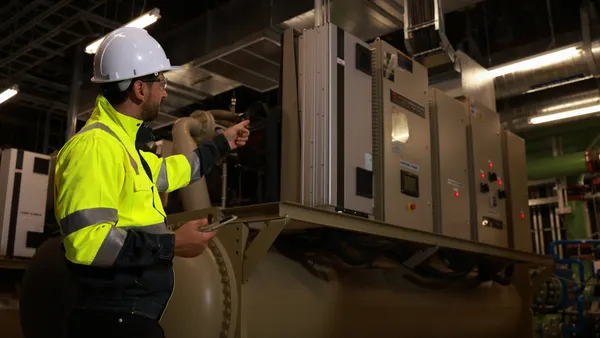Dive Brief:
- Facility managers that adopt an analytical mindset to complement their technical skills can improve their operations by leveraging the smart-building data they collect. That’s one of the take-aways from the International Facility Management Association’s World Workplace 2025 conference held in Minneapolis earlier this month.
- IFMA’s 30th annual flagship event drew more than 4,000 facilities management professionals, 350 exhibitors and dozens of speakers, many of whom challenged attendees to make their facilities — and approach to facilities management — more efficient and responsive to data.
- In an interview, IFMA Director of Research Matt Tucker detailed the idea of an “FM analyst” mindset that facilities managers are encouraged to adopt to make sense of the influx of data they’re getting from all of their digital tools.
Dive Insight:
The “FM analyst” position is less a formal job title or credential than a “mindset” driven by the proliferation of data and the rise of AI against a backdrop of sophisticated cybersecurity threats, Tucker said.
Facilities managers almost have more data than they know what to do with, with much of it disorganized or siloed by location or department, Tucker said. This new normal demands a new approach that he described broadly as ”developing an analytical brain” — layering information synthesis and effective communication on top of existing FM expertise.
“Traditionally, FMs are amazing at technical tasks, but do we have the same skill set from an analytical perspective?” he said.
Answering that question is urgent amid generational change in the facilities management profession, Tucker said. He expects the majority of the facilities management workforce to turn over within the next 15 years.
He called out two skills that FM analysts need in abundance: storytelling and the ability to collaborate.
Storytelling is vital for FMs to knit patterns and trends out of the data their systems are generating and then translate what they see for the C-suite. When advocating for a digital transformation project, for example, FMs need to speak in a language their chief technology officer understands without getting too deep into the facility's weeds — even if they think their audience can follow along.
Facility managers should ask themselves “‘Am I being convincing at the C-suite level?’” Tucker said. Executives “don’t want to be bombarded with spreadsheets, so the presentation has to be to the point.”
Given the importance of data, which crosses function areas, facilities managers must become comfortable collaborating with colleagues in other departments like finance, human resources and information technology.
“I don’t think we can be successful anymore just working on FM,” he said.
The importance of a data-driven, multidisciplinary approach to facilities management was on full display at the conference. Dozens of companies — including some of the biggest names in built environment technology — demonstrated solutions for more streamlined, efficient facilities.
The Johnson Control product OpenBlue, for example, uses AI to make sense of cross-functional data to help facilities managers improve space usage, reduce energy consumption and cut building maintenance workloads by up to two-thirds.
“The siloes are long gone,” said Vineet Sinha, vice president of product management that leads development of OpenBlue enterprise solutions at Johnson Controls.
Sinha said modular tools like OpenBlue can do a lot of the heavy lifting for facilities managers overseeing complex footprints, regardless of the parent organization’s digital maturity, and even help FMs drive more digital investment.
“Our advantage is meeting them where they're at in terms of digital maturity and then ramping from there,” said Sinha.















